Physician Digital Marketing
Marketing Tips for Physicians
We keep updated on the latest marketing trends for physicians. This includes search ads, social media, email marketing, lead generation, CRO, and more!
Digital Marketing Services
Digital Marketing Strategies for Doctor's Office
Digital marketing for doctor's office involves advertising online using websites, search results, social channels, email campaigns, or even mobile apps.
Many physicians think digital advertising is just another term for SEO or paid ads. While both of those services are used in physician online marketing, neither completely explains the depth of a robust website marketing program.
Modern website advertising services often include dozens of strategies, all working together to help your doctor's office improve visibility and conversions.
Let's discuss what our digital advertisers have found to work best for those in this industry!






50+ Internet Marketing Solutions for Physicians
We're a team of online marketing professionals with deep knowledge of website marketing needs for doctor's office.
For years, our team has assisted physicians with their digital marketing goals. The strategies / tactics discussed in this section can help with website advertising for physicians and even:
- Pediatricians
- Family Physicians
- Internal Medicine Physicians
- Cardiologists
- Dermatologists
- Gastroenterologists
- Neurologists
- Obstetricians / Gynecologists
- Oncologists
- Ophthalmologists
- Orthopedic Surgeons
- Psychiatrists
- ...and more!
A Few of Our Digital Marketing Experts






1.) Lead Generation for Physicians
Lead generation is a crucial digital marketing strategy for physicians to attract new patients and increase their practice's visibility. By implementing targeted tactics, you can effectively connect with individuals who are in need of medical services or seeking healthcare advice. Here are 5-10 specific strategies to help you generate more leads as a physician:
- Content Marketing: Create a blog or resource section on your website where you regularly publish informative articles, medical insights, and answers to frequently asked questions. Focus on topics that address common health concerns or provide valuable information about specific medical conditions. By offering valuable content, you can attract individuals who are seeking medical information and position yourself as a trusted source.
- Local SEO: Optimize your website for local search by including relevant keywords, location-specific information, and ensuring your contact details are consistent across online directories. Encourage satisfied patients to leave reviews on platforms like Google My Business. By improving your local search visibility, you can increase the chances of potential patients finding your practice when searching for medical services in your area.
- Telemedicine Services: Offer telemedicine services for patients who prefer remote consultations or have difficulty accessing your physical location. Promote these services on your website and social media platforms, highlighting the convenience and accessibility they provide. By offering telemedicine, you can expand your reach and attract patients who value flexible healthcare options.
- Targeted Advertising: Utilize online advertising platforms, such as Google Ads or social media ads, to target individuals in your local area who are actively searching for medical services or have shown interest in relevant health topics. Craft compelling ad copy that emphasizes your expertise, personalized care, or specialized treatments. By targeting your ads to the right audience, you can increase the likelihood of attracting potential patients.
- Physician Referral Programs: Establish partnerships with other healthcare professionals, such as specialists, therapists, or chiropractors. Develop a referral program where you exchange patient referrals with these professionals. By collaborating with complementary healthcare providers, you can expand your network and receive patient referrals.
- Email Newsletters: Develop a regular email newsletter that provides health tips, updates on medical advancements, and exclusive offers. Encourage visitors to your website to subscribe to your newsletter by offering a free health resource or special promotion. By nurturing leads through email marketing, you can stay connected with potential patients and build trust in your expertise.
- Online Appointment Scheduling: Implement an online appointment scheduling system on your website. Make it easy for patients to book appointments directly from your site, reducing barriers to access and streamlining the process. By offering convenient appointment scheduling, you can attract individuals who prefer online interactions and value efficiency.
- Patient Testimonials and Success Stories: Showcase patient testimonials and success stories on your website and social media platforms. Feature stories that highlight positive outcomes, compassionate care, or successful treatment journeys. By sharing real-life experiences, you can build trust and provide social proof of your expertise.
- Community Involvement: Engage with your local community by participating in health fairs, seminars, or workshops. Offer free health screenings or educational sessions on topics of interest. By actively participating in community events, you can establish yourself as a caring and engaged physician, attracting individuals who appreciate community involvement.
- Medical Webinars or Online Workshops: Host webinars or online workshops on health-related topics that are relevant to your specialization or patient base. Invite individuals to register for these events through your website or social media channels. Offer valuable insights, answer questions, and provide expert guidance. By organizing educational webinars, you can position yourself as a trusted source of medical information and attract individuals who are interested in learning more about their health.
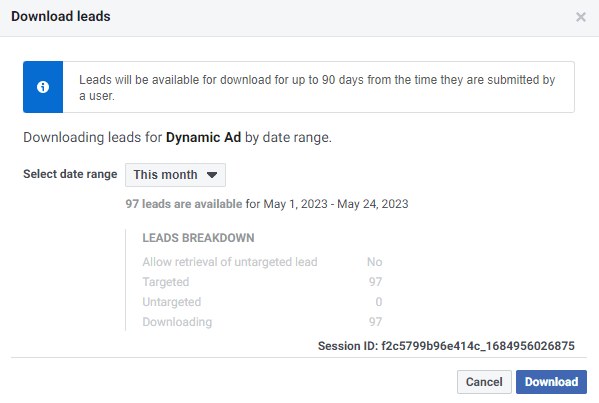
2.) Social Advertising for Physicians
As a physician, social advertising can be an effective way to connect with potential patients and promote your medical services. Here are five examples of how social advertising can help your medical practice:
- Telemedicine Services: Use social media ads to promote your telemedicine services. Target users who are interested in health and wellness or who have engaged with medical content. Highlight the convenience and accessibility of virtual consultations, especially for patients who may prefer remote medical care or have mobility issues.
- Health and Wellness Tips: Create social media ads that offer health and wellness tips or educational content related to your medical specialty. Target users interested in healthcare and those who follow relevant topics. Providing valuable information can position you as an authority in your field and attract potential patients who seek reliable medical advice.
- Community Outreach Programs: Advertise community outreach programs or health events hosted by your medical practice. Use targeting options to reach users in your local area. Participating in community events can help raise awareness about your practice and demonstrate your commitment to improving public health.
- Specialized Treatments or Procedures: Promote specialized treatments or medical procedures you offer. Use targeting options to reach users who may have specific medical conditions that align with your services. Highlighting your expertise in specialized areas can attract patients seeking advanced medical care.
- Patient Testimonials: Run social media ads featuring testimonials from satisfied patients. Target users in your local area who may be seeking medical services. Positive testimonials can build trust in your medical practice and encourage potential patients to choose you as their healthcare provider.
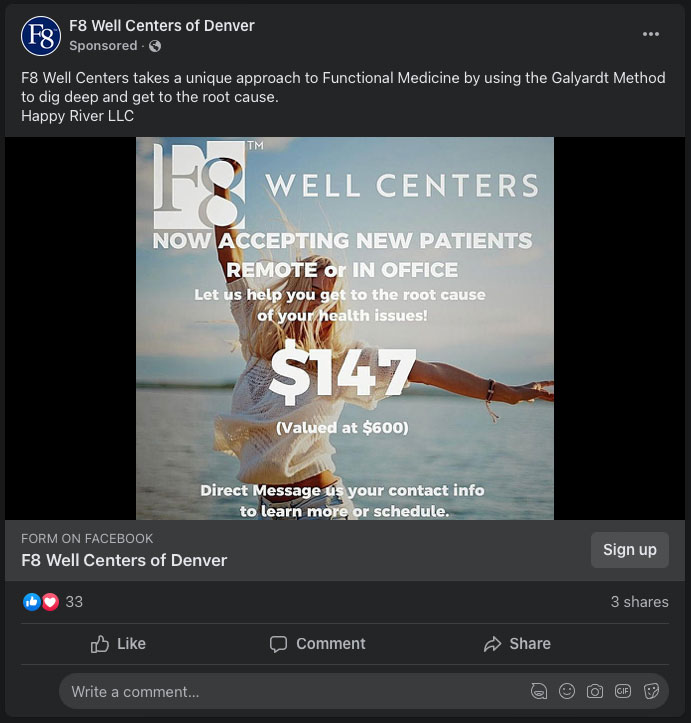
3.) Conversion Rate Optimization (CRO) for Physicians
Conversion rate optimization is a vital digital marketing strategy for physicians to enhance their online presence and attract more patients. By optimizing various elements of your website and paid advertising, you can increase conversions and grow your patient base. Here are some examples of how CRO can help your medical practice get more conversions:
- Clear and Informative Website Design: Ensure your website has a clear and professional design with easy navigation. Providing comprehensive information about your medical services, expertise, and office hours can help potential patients feel confident in choosing your practice.
- Strategic Call-to-Action (CTA) Placement: Place compelling and relevant CTA buttons strategically throughout your website. For example, use "Book an Appointment," "Contact Us," or "Get a Free Consultation" CTAs to encourage visitors to take the desired action and schedule an appointment.
- Patient Testimonials and Reviews: Showcase authentic patient testimonials and reviews on your website. Positive feedback from satisfied patients can build trust and credibility, persuading potential patients to choose your services.
- Specialized Landing Pages: Create dedicated landing pages for specific medical services or treatments you offer. Tailor the content to address the unique needs of patients seeking those services, increasing the chances of conversion.
- Online Appointment Booking: Implement a user-friendly online appointment booking system. Allowing patients to easily schedule appointments through your website eliminates barriers and makes the booking process convenient for them.
- Informative Blog and Content: Publish informative and relevant blog posts and articles related to your medical specialty. Educational content establishes you as an authority in your field and attracts organic traffic, increasing potential patient conversions.
- Effective Paid Advertising: Optimize your paid advertising campaigns with targeted keywords and ad copy. Create specific ad groups for different medical services you provide, directing users to specialized landing pages, which can improve ad relevance and conversion rates.
- Mobile Optimization: Ensure your website is fully optimized for mobile devices. A mobile-friendly site provides a seamless experience for patients visiting your site on their smartphones, leading to higher conversion rates.
- Virtual Consultations: Offer virtual consultation options for patients who may prefer remote medical services. Implementing a smooth and secure virtual consultation process can attract a broader audience and increase conversion rates.
- Trust and Privacy Assurance: Clearly communicate your commitment to patient privacy and data security on your website. Providing a secure environment for patients to share their information can foster trust and lead to more conversions.
4.) Sales Funnels for Physicians
As a physician, sales funnels can be a highly effective digital marketing strategy to attract new patients, provide valuable health information, and nurture leads into loyal clients. Sales funnels allow you to deliver personalized content and guide potential patients through their decision-making journey. Here are 5 examples of how sales funnels can benefit your medical practice:
- Healthcare Quiz Funnel: Create an interactive quiz on your website that helps users assess their health conditions or risk factors. Promote the quiz through social media and email marketing. Based on their quiz responses, provide personalized health recommendations and tips. Offer an option to book a consultation with you to discuss their results further and explore appropriate treatment plans. This funnel not only engages potential patients but also positions you as an authoritative and caring physician.
- Monthly Health Newsletter Funnel: Offer a monthly health newsletter subscription through a dedicated landing page on your website. Promote the newsletter through various channels, such as your website, social media, and email campaigns. In the newsletter, provide valuable health-related content, such as health tips, latest medical research findings, and updates on healthcare practices. Include a call-to-action in the newsletter for readers to schedule a check-up or consultation with you, making it an excellent lead generation tool for your practice.
- Telemedicine Consultation Funnel: Offer telemedicine consultations for patients who may prefer remote medical visits. Create a landing page that explains the benefits of telemedicine and how it works. Promote the service through online ads and email marketing. Allow patients to schedule telemedicine appointments easily through a booking system integrated with the landing page. During the telemedicine consultation, diagnose and address patients' health concerns and recommend further in-person visits for more complex cases, ultimately increasing patient retention and satisfaction.
- Post-Procedure Follow-Up Funnel: Implement a post-procedure follow-up funnel to enhance patient care and build long-term relationships. After a patient undergoes a medical procedure or treatment, send automated post-procedure emails to check on their recovery and well-being. Include useful tips for a speedy recovery and inform them about upcoming follow-up appointments. This personalized approach shows that you genuinely care about their health and helps foster patient loyalty.
- Health Seminars/Webinars Funnel: Host educational health seminars or webinars on specific medical topics, such as managing chronic conditions or preventive health measures. Promote the seminars through your website, email, and social media. During the seminars, share valuable insights and practical advice. At the end of each seminar, offer attendees the opportunity to book a consultation with you to discuss their individual health concerns. This funnel establishes your expertise and establishes trust, leading to an increase in patient conversions.
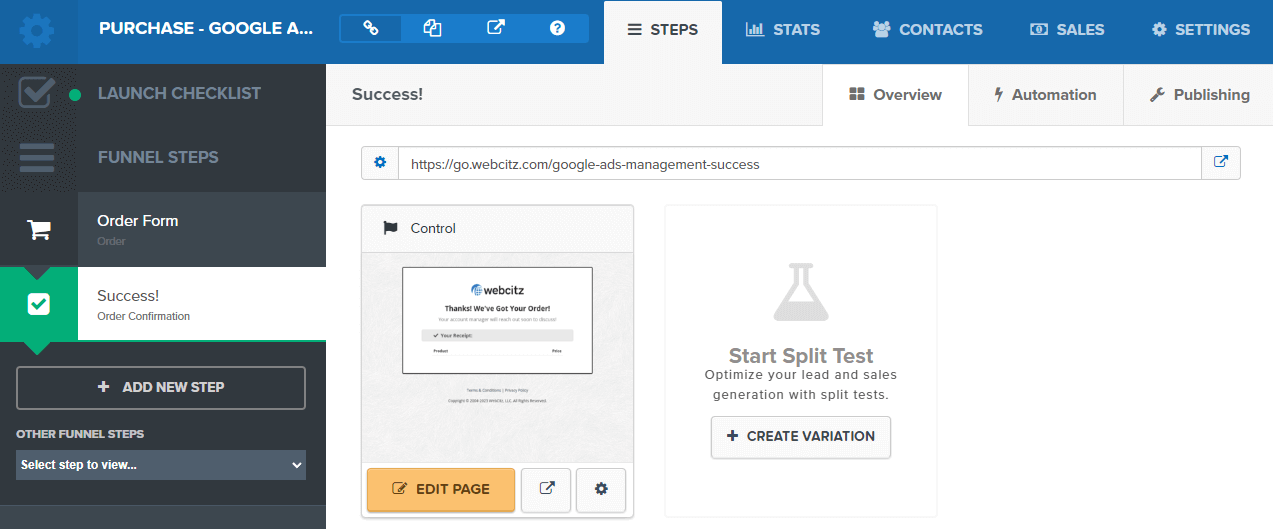
5.) Email Marketing for Physicians
As a physician, email marketing can be a highly effective digital marketing strategy to enhance patient communication, provide valuable health information, and promote your medical practice. By leveraging email campaigns, you can establish strong connections with your patients and foster trust in your expertise. Here are six examples of how email marketing can benefit your medical practice:
- Health Tips and Education: Send informative emails with health tips, preventative measures, and educational resources to your patients. Empower them to take charge of their well-being and encourage regular check-ups to stay on top of their health.
- Appointment Reminders: Utilize email to send appointment reminders to your patients. This helps reduce no-show rates and ensures patients are well-prepared for their visits, leading to a more efficient and effective practice.
- Seasonal Health Campaigns: Launch seasonal health campaigns through email to address specific health concerns during different times of the year. For example, you can run a flu vaccination campaign during flu season to promote preventive care.
- Post-Visit Follow-Ups: Send personalized follow-up emails to patients after their visits. Express gratitude, summarize the treatment plan, and provide any additional instructions or resources they may need for a successful recovery.
- Health Event Invitations: Invite patients to health seminars, webinars, or workshops organized by your medical practice. Email marketing enables you to reach a wide audience and create awareness about important health events.
- Patient Satisfaction Surveys: Gather patient feedback through email surveys. This helps you understand their experiences, identify areas for improvement, and enhance patient satisfaction and retention.
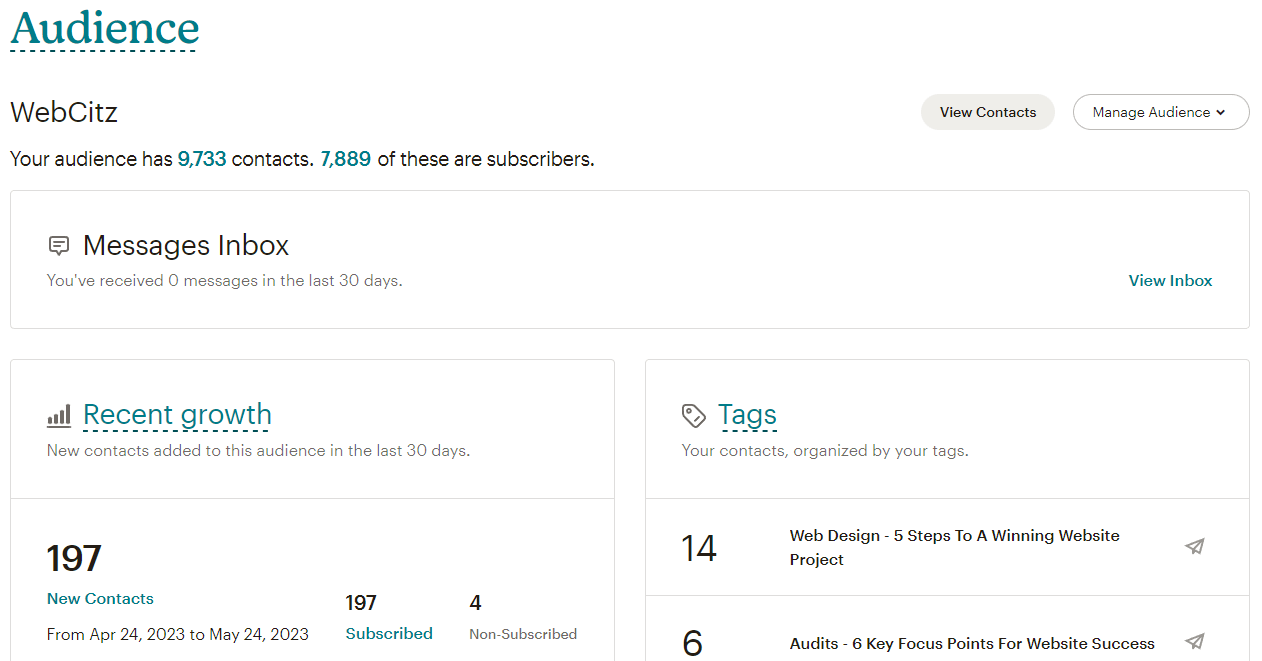
6.) Search Advertising for Physicians
Search advertising can be a powerful strategy to promote your medical practice and connect with potential patients who are actively searching for healthcare solutions. By utilizing search ads, you can increase your online visibility and attract more patients to your clinic or hospital. Below are five examples of how search advertising can benefit your medical practice and help you provide quality healthcare to your community:
- Medical Specializations: Create search ads targeting individuals searching for specific medical specializations. Use keywords like "cardiologist near me" or "pediatrician in [your city]" to reach patients seeking specialized care. This strategy allows you to showcase your expertise and attract patients in need of tailored medical solutions for their specific conditions.
- Urgent Care Services: Advertise your urgent care services through search ads. Target keywords like "emergency walk-in clinic" or "24/7 urgent care" to connect with patients in need of immediate medical attention. This strategy allows you to position your medical practice as a reliable option for urgent healthcare needs, especially during critical situations.
- Preventive Care and Screenings: Run search ads to promote your preventive care and health screening services. Use keywords like "annual physical exam" or "preventive health check-up" to reach individuals interested in proactive healthcare. This strategy allows you to emphasize the importance of preventive measures and attract patients who prioritize their overall well-being.
- Telemedicine Consultations: Create search ads offering telemedicine consultation services. Target keywords like "virtual doctor appointments" or "online medical consultations" to reach patients looking for remote healthcare options. This strategy allows you to provide healthcare services beyond your local area and offer convenience to patients who prefer remote consultations.
- Chronic Condition Management: Showcase your expertise in managing chronic conditions through search ads. Use keywords like "diabetes management clinic" or "hypertension specialist" to connect with patients living with chronic illnesses. This strategy allows you to demonstrate your ability to provide comprehensive care for patients with long-term health needs, building trust and loyalty among your patient base.
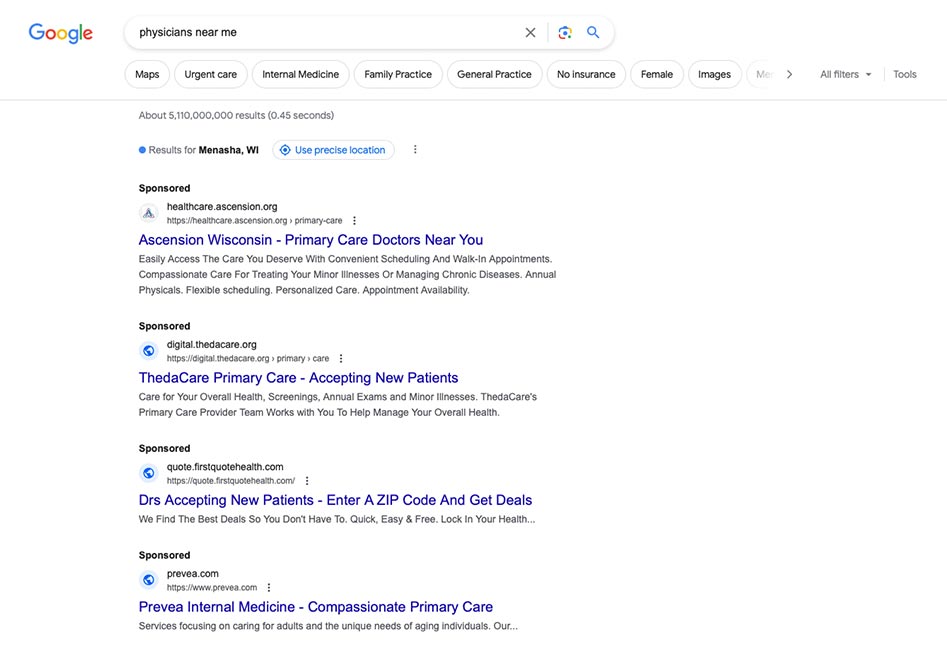
7.) Content Marketing for Physicians
As a physician, content marketing can be a highly effective digital marketing strategy to establish yourself as an authority in your field, educate your patients, and attract new clients to your practice. By producing valuable and informative content, you can build trust with your audience and showcase your expertise in the medical field. Here are five examples of how content marketing can help your medical practice:
- Healthcare Blog: Create a healthcare blog on your website where you regularly publish informative articles on various medical topics. Address common health concerns, provide insights into different medical conditions, and offer tips for maintaining overall health. Your blog can serve as a valuable resource for patients seeking trustworthy medical information.
- Video Q&A Series: Produce a series of video Q&A sessions where you answer frequently asked medical questions from your patients. These videos can cover topics such as common symptoms, medical procedures, or lifestyle tips for preventing certain conditions. By addressing patient queries through videos, you can enhance patient engagement and communication.
- Medical Infographics: Design and share medical infographics that visually explain complex medical concepts or present statistical data related to specific health issues. Infographics are highly shareable and can help disseminate important health information across social media platforms, increasing your online visibility and reach.
- Online Webinars: Host live webinars on specialized medical topics or emerging healthcare trends. Invite patients and other healthcare professionals to participate in these webinars and interact with you in real-time. Webinars can help you demonstrate your expertise, connect with a broader audience, and strengthen your credibility as a medical expert.
- Patient Stories and Testimonials: Share inspiring patient stories and testimonials on your website and social media platforms. Highlight successful treatment outcomes, patient recovery journeys, and positive experiences at your medical practice. Genuine patient testimonials can create a sense of trust and confidence in your medical services among potential patients.

8.) Reputation Management for Physicians
As a physician, reputation management is a crucial digital marketing strategy to establish your credibility, build trust with patients, and enhance your online presence. It involves actively managing and promoting your positive reputation online to attract more patients and grow your medical practice. Here are five examples of how reputation management can benefit your physician practice:
- Showcase Medical Expertise: Highlight your medical expertise and specialties on your website and social media profiles. For example, if you are a cardiologist, emphasize your experience in treating cardiovascular diseases and include case studies showcasing successful treatments. This will position you as an expert in your field and attract patients seeking specialized care.
- Collect and Share Patient Testimonials: Request patient testimonials and success stories from satisfied patients. Feature these testimonials on your website and in your marketing materials to showcase your track record of providing excellent patient care. Positive patient testimonials can significantly influence prospective patients in choosing your services.
- Manage Online Reviews: Monitor and respond to patient reviews on platforms like Google, Healthgrades, and RateMDs. Address both positive and negative reviews promptly and professionally. Responding to reviews shows that you value patient feedback and are committed to providing the best possible care.
- Offer Telemedicine Services: Provide telemedicine consultations for patients who prefer virtual visits or have difficulty accessing your clinic in person. Offering telemedicine services demonstrates your adaptability and commitment to patient convenience and accessibility, which can enhance your reputation and attract a broader patient base.
- Create Educational Content: Develop and share educational content on your website and social media channels. This content can include articles, videos, or infographics about various medical conditions, treatment options, and preventive care. By sharing valuable medical insights, you establish yourself as a reputable source of medical information, which can attract patients seeking reliable healthcare advice.
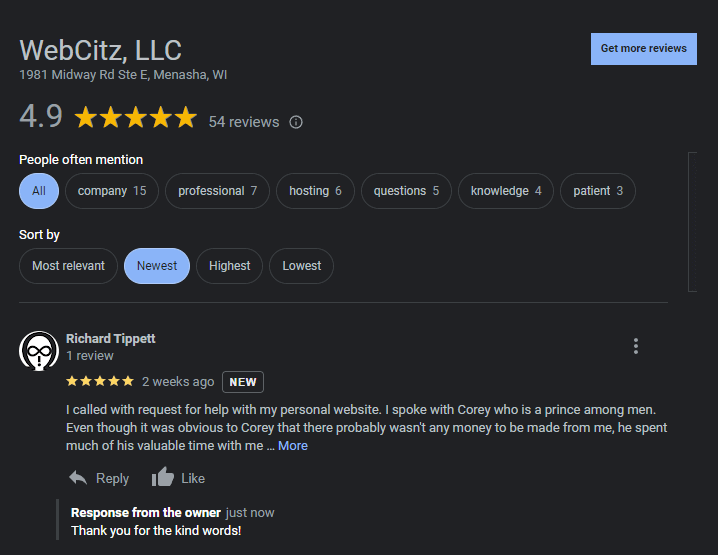
9.) Video Marketing for Physicians
As a physician, integrating video marketing into your digital strategy can significantly enhance your online presence and patient engagement. Video content allows you to connect with patients on a more personal level, educate them about healthcare topics, and establish yourself as a trusted medical expert. Here are five examples of how video marketing can help your medical practice:
- Health Tips and Advice: Create short videos where you share valuable health tips and advice on common health issues. These can include tips for maintaining a healthy lifestyle, managing chronic conditions, or preventing certain illnesses. Providing expert advice through video can establish you as a reliable source of healthcare information.
- Procedure Explanations: Film videos that explain medical procedures and treatments in layman's terms. Many patients may feel anxious or uncertain about medical procedures, and video explanations can help alleviate their concerns by providing clear and concise information about what to expect.
- Patient Testimonials: Feature video testimonials from satisfied patients who have experienced positive outcomes under your care. Hearing about real-life success stories can instill confidence in potential patients and demonstrate your commitment to providing quality healthcare services.
- Virtual Telemedicine Appointments: Offer virtual telemedicine appointments through video consultations. This allows you to reach and treat patients remotely, making healthcare more accessible and convenient for individuals who may have mobility challenges or live in remote areas.
- Medical Education: Use video to educate patients about specific medical conditions, treatment options, and recovery processes. Visual aids can enhance patients' understanding of complex medical concepts and encourage them to be more proactive in managing their health.







